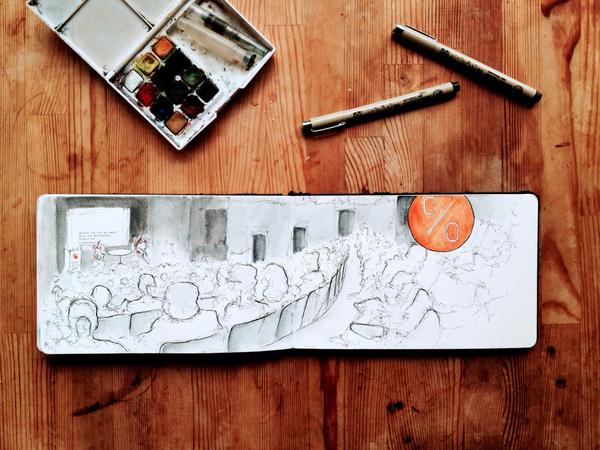by Jenny Guan
Overcommit, others first, do too much.
After-work exhaustion means ramen in bed.
Will day be crazy? Never know!
These are a sampling of six words stories contributed by attendees of the October 2014 Equity by Design symposium breakout session on work life balance: What’s Flex Got to Do With It? Win Win Strategies for Work Life-Flexibility. As we gleaned from the Missing 32% 2014 survey results, this was a topic that affects all in our profession, regardless of gender, years of experience, and firm role. This subject is also one that lends itself to many personal anecdotes, and our session focused on exploring strategies for finding that healthy equilibrium between work and life through the power of the personal narrative.
EQxD Symposium Sketch by Jenny Guan
Prior to the symposium, attendees were asked to complete a quick activity: provide two (very short) stories, six words each; one for their relationship to the day to day experience, and one in the context of major life events such as family or medical emergencies, childbirth, or career sabbatical. The prompt also requested volunteers from those those that were interested in expanding on their six words by presenting their experience on stage during the breakout session, forming a springboard for productive dialog.
Our panelists, Carole Wedge (principal, Shepley Bulfinch) and Francis Pitts (principal, Architecture+), kicked off the session by sharing their own stories of how they achieve healthy live-work balance in their personal lives and in their practices. Carole emphasized the importance of an enriching life outside the office, while Francis shared how the death of a firm partner’s spouse led to a reevaluation of how the office approached flexible working schedules to accommodate the curve balls of life.
Symposium Attendees learning about Work/ Life Flex
photo by Daniel Wang
The audience storytelling portion followed, first with presentations of the various short stories submitted beforehand. Those mere six words revealed tales of frustration (little room at office for emotion), priorities (my daughters only have one childhood), challenging questions (sick kid: work or make soup?), tales with endings (had baby, had to leave architecture), successful strategies (after kids, office allowed flex, telecommute), and wise words (at least one hour should be happy).
Three volunteer storytellers, their names randomly picked from a bag, took the stage to share their experiences on their battle against the culture of busy. These three minute tales were amplified by dialog from Carole and Francis as they offered up personal perspectives and potential solutions.
The last narrative of the hour underlined the importance of bringing these stories into the public realm: the attendee related an experience where her once-enthusiastic clients questioned her abilities and commitment to their project once she informed them of her upcoming wedding. In three minutes, the relevant topics of gender perception, client misconceptions, and the challenges of “achieving it all” were identified and presented for further dialog. Are women subject to more scrutiny in their pursuit of work/life balance? What could be done to educate those we serve in this profession? How can we communicate our ability to stay on task in the office while we pursue our lives outside of it?
At the end of the session, many names were still left in the bag- untold stories that signified a desire to share and an eagerness to spark a conversation. Although many of these experiences were ones in search of solutions within ourselves, our practices, and our industry, some served up words through a much more panoramic lens:
No day has balance, only years.
Work can always wait. Life's important.
Work life balance is always perspective.
We will continue this conversation about work life balance in the architecture field at the 2nd of 4 EQxD "U" Workshops - What's Flex got to do with Success? (Win-Win Strategies for Work/Life Flexibility) on June 11 at SF AIA.
We will explore the complexities of making work and life "work" together to fulfill your maximum potential while enjoying the journey along the way. Work life flexibility emerged as a major theme of last year's Equity in Architecture survey. Flexibility was one of the most important ways that our survey respondents defined success in their careers. The survey also shows that inflexible schedules and long hours are a real burden on our field - a significant portion of respondents had turned down opportunities or promotions due to issues of flexibility, people are leaving the field due to long hours and low pay, and taxing work schedules are a major obstacle to licensure.

